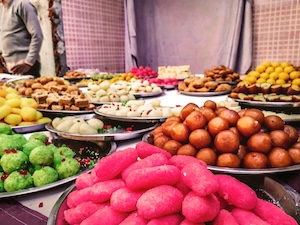Every year, I use Diwali as a moment to pause and reflect. Not in any formal way, not tied to ritual or ceremony but just a natural checkpoint (a database intended pun) where the lights come on and I look back at the year behind me, and forward at what’s ahead.
It’s one of my favorite festivals, and I’d be lying if I said the sheer diversity and volume of sweets I consume during this period doesn’t have something to do with it. Gulab jamuns, jalebis, kaju katli, laddoos - each one a small, sugar-drenched argument for celebration. But it’s more than the sweets.

Diwali is the festival of lights. Rows of oil lamps against doorways, fireworks lighting up the sky, homes glowing warm against the night. But growing up, what stayed with me wasn’t just the spectacle. It was the way the festival brought people together. Everyone. No questions asked.
A child raised by Muslim parents carefully shaping clay into a small diya, then lighting it in a Hindu neighbor’s home during the evening puja. Celebrating with Catholic friends, their homes lit up just the same, sweets exchanged across thresholds without a second thought. That was the world I grew up in. It was messy, loud, imperfect, but gloriously pluralistic. A place where festivals weren’t owned by one group but shared by all.
It wasn’t paradise. There were tensions, contradictions, inequalities. But there was also this basic, beautiful idea that you could belong without erasing someone else. That light was abundant, not scarce.
I look around now, and it’s harder to ignore what’s happening. The suspicion creeping into everyday conversations. The unsecular ideas dressed up as strength, as tradition, as protection. The growing sense that belonging has become conditional, that some lights are deemed more legitimate than others.
And the ugliness isn’t localized. Hate spilling across comment sections and newsfeeds. Racism against Muslims treated as casual commentary. Politicians with brown skin and the “wrong” names facing vitriol that would have been unthinkable just a few years back. The darkness comes from all directions now, and it’s easy to feel like the world is closing in.
It’s easy to feel hopeless. To let the noise drown out the memory of what once was, and what still could be. To think maybe those pluralistic ideals were always a mirage, that the harmony was temporary, that darkness was always winning.
But Diwali reminds me that light isn’t passive. It’s a practice. You light the lamp where it’s darkest. You light it when it feels futile. You light it especially when the world tells you it’s easier to let the darkness win.
So this Diwali, a small reminder to myself, and maybe to you. Light the lamp. Not just in your home, but between people. In conversation, in community, in the spaces where it’s hardest to do so. Choose warmth over heat. Choose curiosity over certainty. Choose kindness over tribe.
Darkness only wins if we stop lighting lamps.
Happy Diwali. Shubh Deepavali.